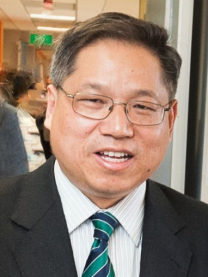讲座题目:Controlled precision polymers, polymeric implants, and drugs
主讲嘉宾:Greg Qiao教授(澳大利亚墨尔本大学)
讲座时间:2024年6月3日(周一)下午2:30
讲座地点:工学四号馆202
讲座人简介:

Professor Greg Qiao received his B.En in Donghua University in 1982 and Ph.D. at the University of Queensland in 1996. He joined the University of Melbourne in 1996 and became a full Professor in 2009. He is currently an Associate Dean in the Faculty of Engineering & IT. He was an Australian Research Council (ARC)’s Future Fellow (2012-2015) and is a Fellow of Royal Australia Chemical Institute (RACI) and Royal Society of Chemistry (RSC), London. Prof Qiao was the Chair of Polymer Division of the RACI (2015-2016) and a member of ARC College of Experts (2016-2018). Prof Qiao received RACI Applied Research Award in 2017, ExxonMobil Award in 2015, RACI’s Polymer Division Citations in 2011 and 2019 as well as the Freehills Award in 2010. He has published more than 300 journal papers and a co-inventor of more than 20 patents. His key research interests are in new polymer synthesis, polymeric drug and drug delivery, biopolymers, and polymers for soft tissue engineering.
报告摘要:
This talk will introduce our recently developed platform technologies based on modern polymer chemistry. The seminar will first describe our latest research on controlled precision polymer synthesis, specifically focusing on new activation or mediation methods for RAFT polymerization. These methods include photo iniferter-RAFT, Sono-RAFT, Fenton-RAFT, blood-catalyzed RAFT, RAFT initiated by the growth of bacteria, as well as those under specific environments such as ionic liquids. An example is the semi bio-Fenton RAFT polymerization of DMA, achieving full conversion within 60 minutes without a loss of chain end fidelity. Using a robot, we were able to create a 39-block copolymer with block sequence control, enabling control over different complex polymer structures with just a click of the mouse.The insights gained from RAFT work in Fenton chemistry also inspired us to design novel therapeutic agents for cancer treatment without using traditional cancer drugs. The Fenton cancer therapy applies cancer's own conditions to facilitate the treatment. The third part of the seminar willpresent our latest work on Structurally Nano-Engineered Antimicrobial Peptide-Polymers (SNAPPs), amino acid-based (lysine and valine) star polymers with 8-32 arms, as potential alternative antimicrobial materials with clinical promise as novel therapeutics to combat antimicrobial resistance (Nat Rev Bioeng, 2024,https://doi.org/10.1038/s44222-023-00143-4).Finally, we will provide an update on our latest work on synthetic cornea research, explaining how polymeric substrates can enhance current cornea surgery and address the shortage of corneal implants.